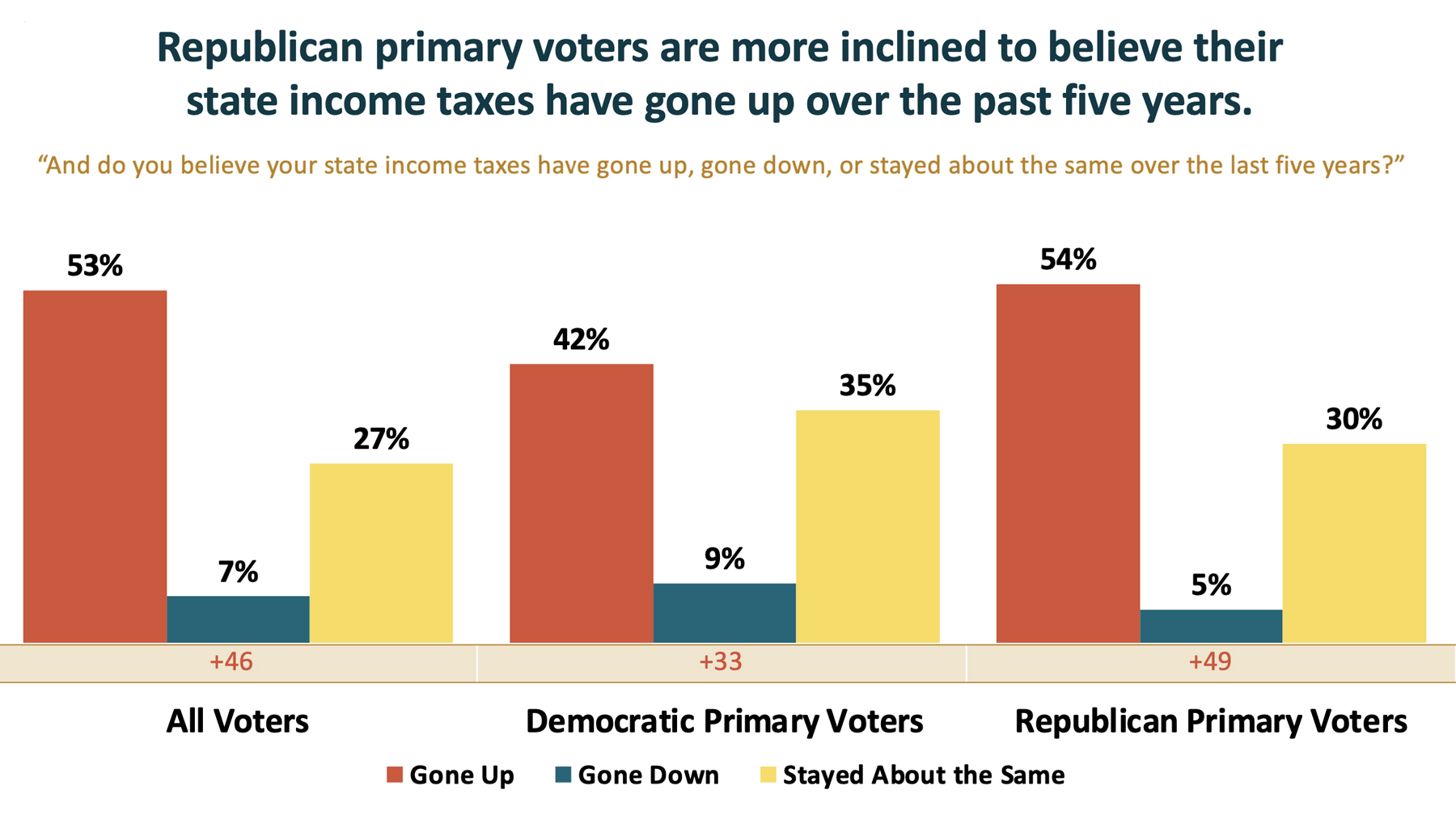by CLC Staff
Last week, we released the first batch of findings from a poll recently conducted for us by Meeting Street Insights. While those results focused on the general political environment in North Carolina (utilizing a sample set of 500 registered voters proportional to the state’s registration breakdown of Democrats, Republicans, and Unaffiliated voters — and then weighted for off-year turnout), today we will look at voters’ outlook on the overall issue agenda, while focusing specifically on the economy (and including state taxes).
Subsequent posts will look at the impact of COVID-19, the public school education in North Carolina, and various other hot-button issues.
(Editor’s note: In addition to the sample set of 500 registered voters, the surveys which produced these additional results were conducted with 400 Democratic primary voters and 400 Republican voters. Among North Carolina’s Democratic primary voters, 60% characterized themselves as ideologically more supportive of President Joe Biden and his agenda as compared to 28% who considered themselves more ideologically aligned with progressive Senators Bernie Sanders of Vermont and Elizabeth Warren of Massachusetts. 12% said they supported neither faction or were not sure. Among North Carolina’s Republican primary voters, 58% characterized themselves as more supportive of former president Donald Trump and his agenda as compared to 37% who indicated they were more supportive of candidates aligning themselves with a more traditional or “establishment” version of the Republican Party. Just 5% said they supported neither faction or were not sure.)
The Overall Issue Agenda
Outside of COVID-19, voters in North Carolina want the state legislature to focus most of its attention on economic issues; a plurality of all voters (41%) and a plurality of Republican primary voters (47%) rate economic issues as their number one concern. Only 27% of Democratic primary voters rate economic issues as their primary concern, tied with health care.
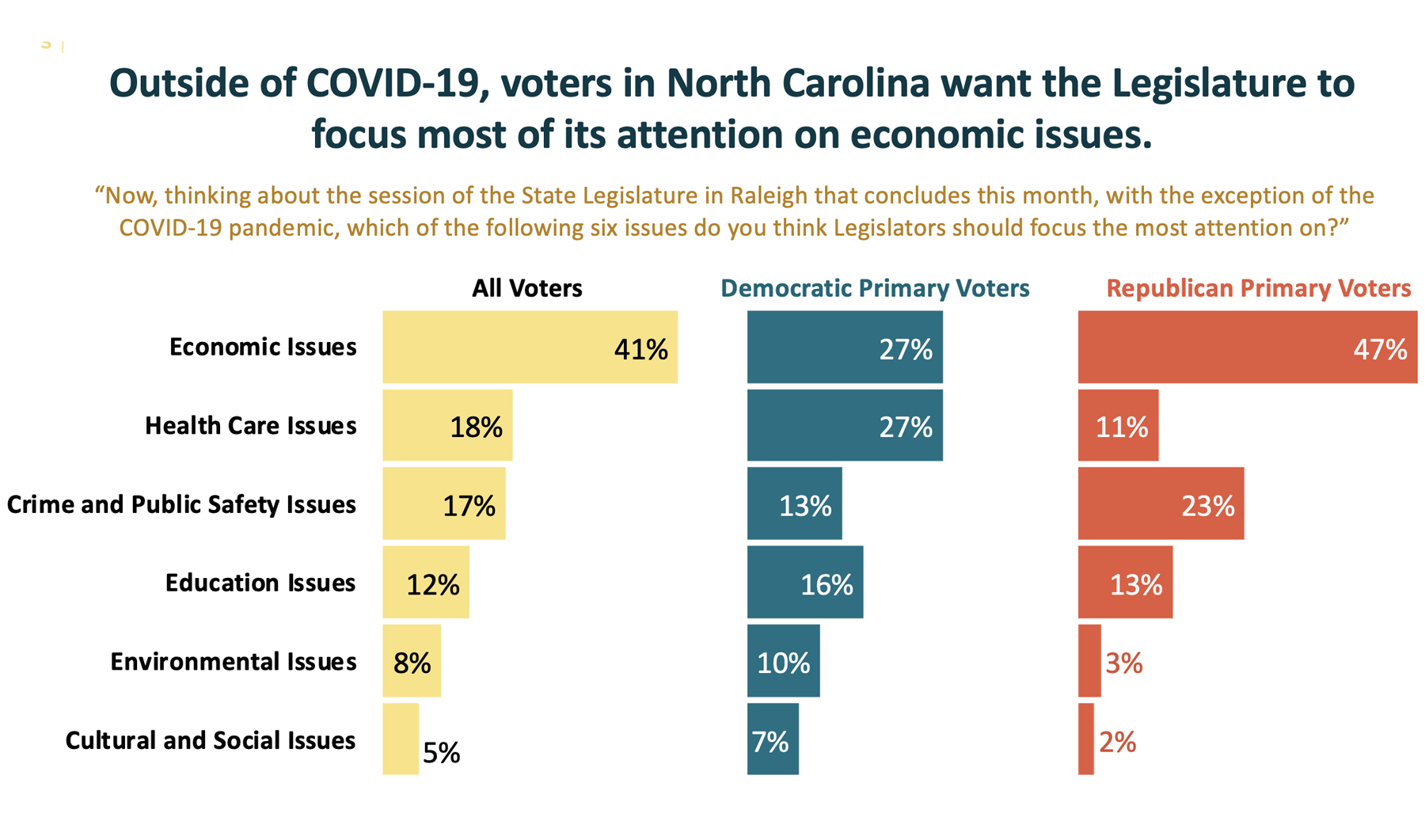
Other issues polled include crime and public safety, education, the environment, and social/cultural issues.
One way to interpret these results (and to drive campaign messaging) is to look at where each party is in terms of the relative importance of an issue compared to where the general electorate as a whole is. We consider this a baseline. And, since the general electorate includes approximately a third Unaffiliated voters (as does our sample of 500 registered voters), it is arguably a more accurate reflection of the electorate at large than is just a subset of Republican or Democrat primary voters.
The closer the numbers align between primary voters and our baseline, the more “winning” is the issue. Conversely, the farther apart they are, the more the party in question could be seen as being “out of touch.” For example, according to our poll, a baseline of 41% of all voters say that economic issues top their list of concerns. The percentage of Republican primary voters agreeing with this sentiment (47%) is closer to this baseline (by six percentage points) than is that of the percentage of Democratic primary voters (27%) — a 14 percentage point difference from the baseline.
Most of these results are not unexpected. For example, environmental issues are more important to Democrats (7%) than they are to Republicans (3%). Similarly, Republicans consider crime and public safety issues as more important (at 23%) than do Democrats (at 13%). Notably, however, only 2% of Republicans consider cultural and social issues as a top priority whereas 7% of Democrats do.
Digging more deeply, we see that the two wings of each party (for the Democrats, the Biden vs. Sanders/Warren wings and for the Republicans, the Trump vs. the traditional GOP wings) see these issues differently as well — especially among Democratic primary voters. For example, 20% of “Biden Wing” voters rate crime and public safety issues as more of a priority — and closer to the Republican position — as compared to just 9% of the “Sanders/Warren Wing”.
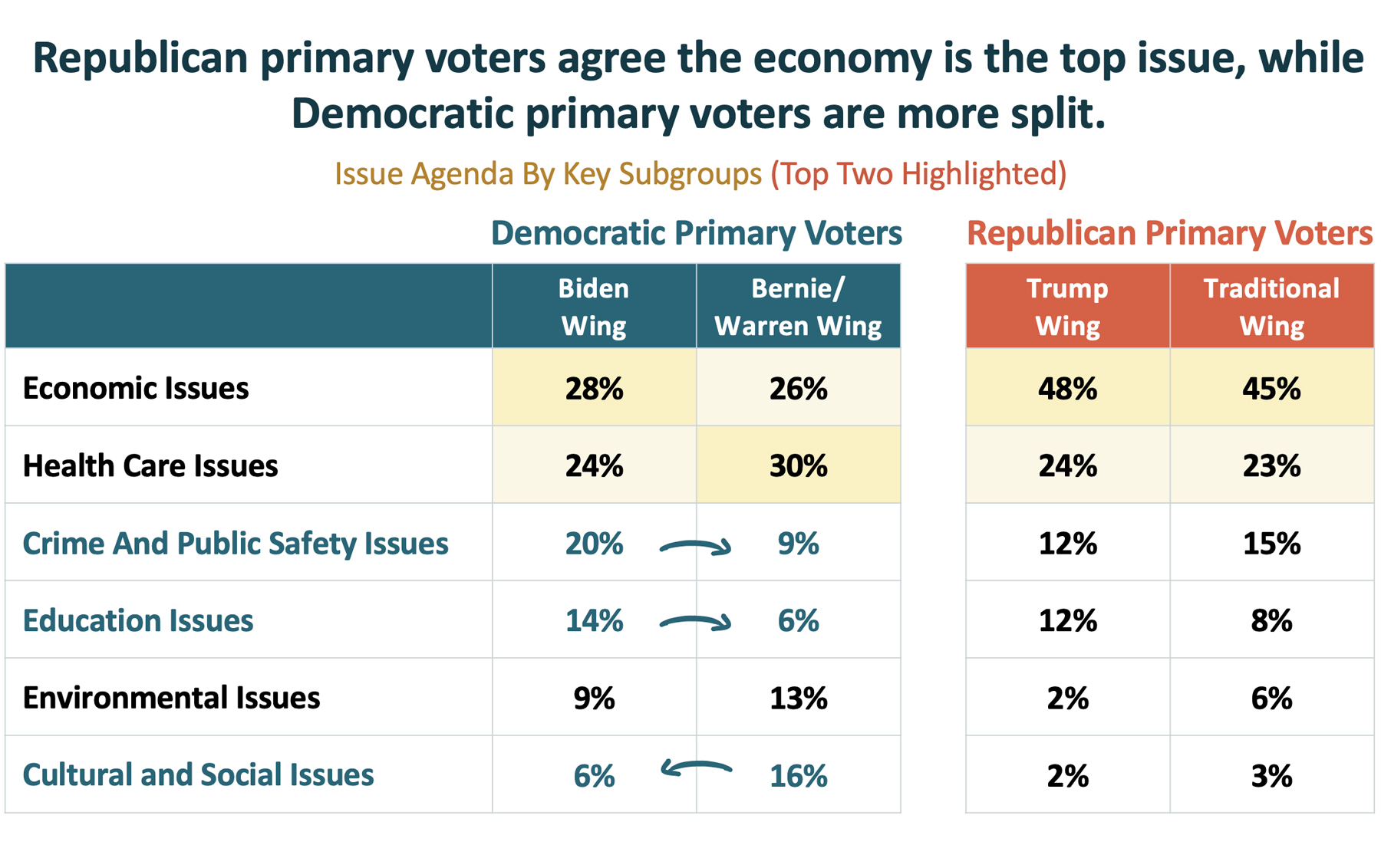
While these questions specifically addressed voter’s priorities for the state legislature, our next set of questions asked which party (Republicans or Democrats) in the state legislature would do a better job of successfully dealing with a wide range of policy items. They included 1) illegal immigration, 2) jobs and the economy, 3) inflation, rising prices, and cost of living, 4) taxes, 5) government spending, 6) keeping communities safe, 7) fighting for working families, 8) giving parents input into education, 9) helping the state recover from COVID-19, 10) public school education, and 11) healthcare.
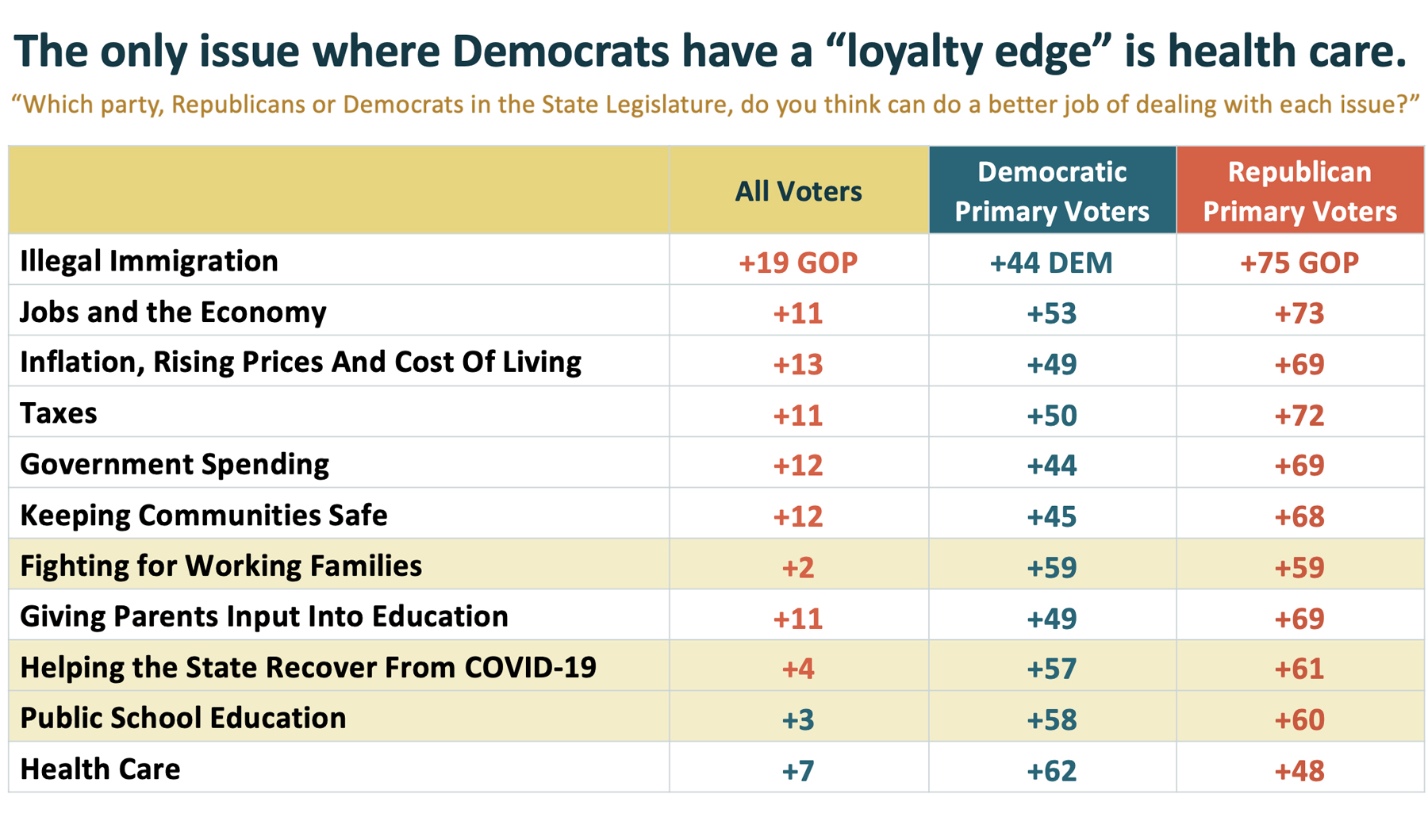
Unsurprisingly, Democratic and Republican primary voters both felt their respective parties would do a better job of dealing with most of the enumerated policy items, although on certain issues for the Democrats (illegal immigration, inflation, government spending, safety, and parental input on education) those numbers were under 50%.
Among all voters, respondents gave Republicans the edge on every issue with the exception of just two: public school education and healthcare, where Democrats prevailed (by three and seven points, respectively). Of the nine issues where Republicans had the edge, seven had Republican support in excess of ten points.

The Economy
Turning to the issues of North Carolina’s economy and their own personal financial situations, respondents were asked if they felt that 1) they’ve become better, 2) become worse, or 3) stayed about the same over the course of the last year. Democratic primary voters felt better both about the state’s economy and their own personal financial situations: 64% of Republicans felt that the state’s economy has become worse (compared to just 32% of Democrats) and 44% of Republicans felt that their own personal financial situations have become worse (compared to just 25% of Democrats). Among all voters, 48% said that the state’s economy had become worse and 40% said that their personal financial situations had become worse.
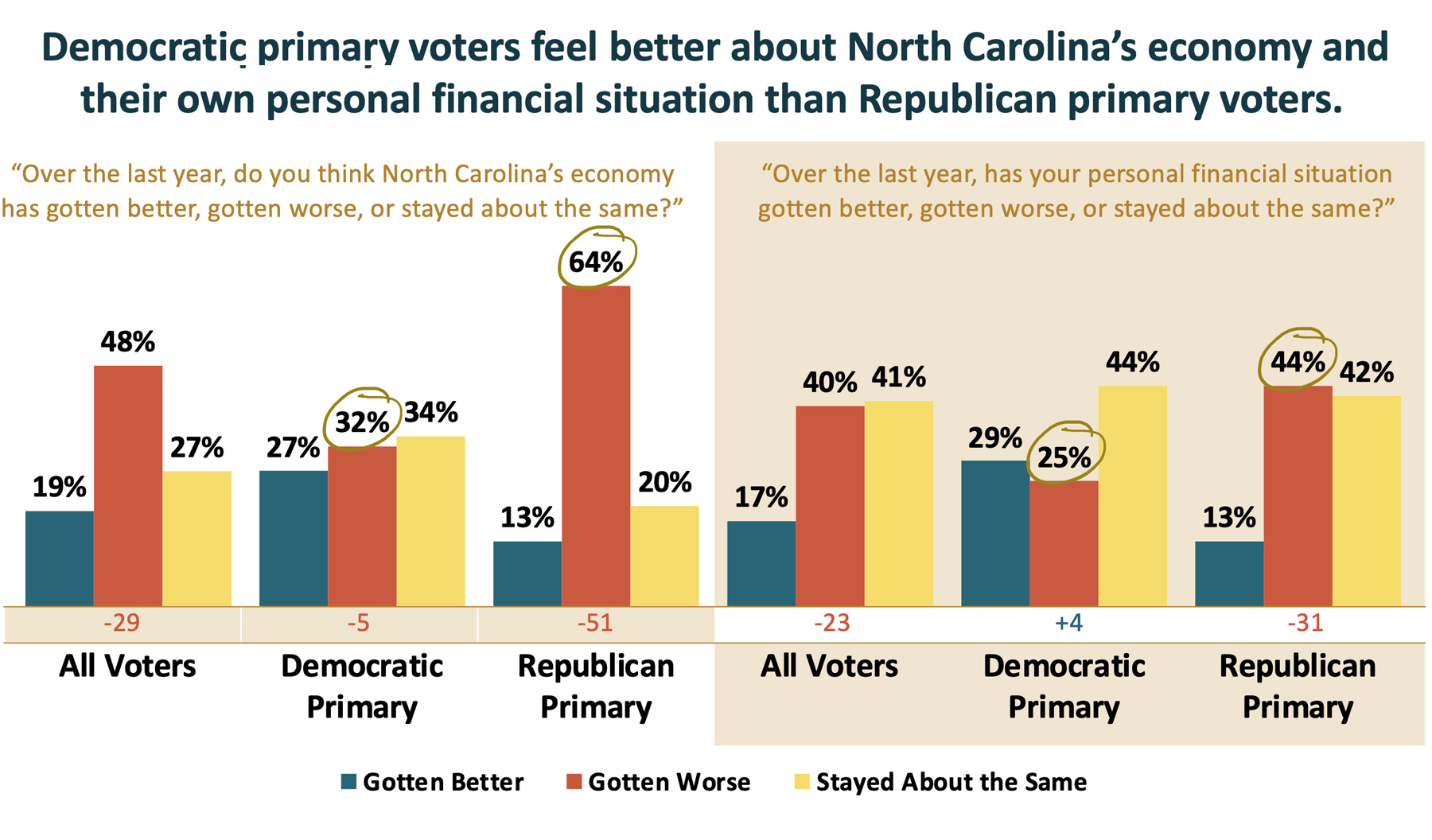
The “Trump Wing” of Republican primary voters is especially negative about both North Carolina’s economy and their own personal financial situations. 73% of Trump Wing voters said that the state’s economy has become worse over the last year and 60% said that their own personal situations have become worse (as opposed to 49% and 27% of of traditional GOP primary voters, respectively.)
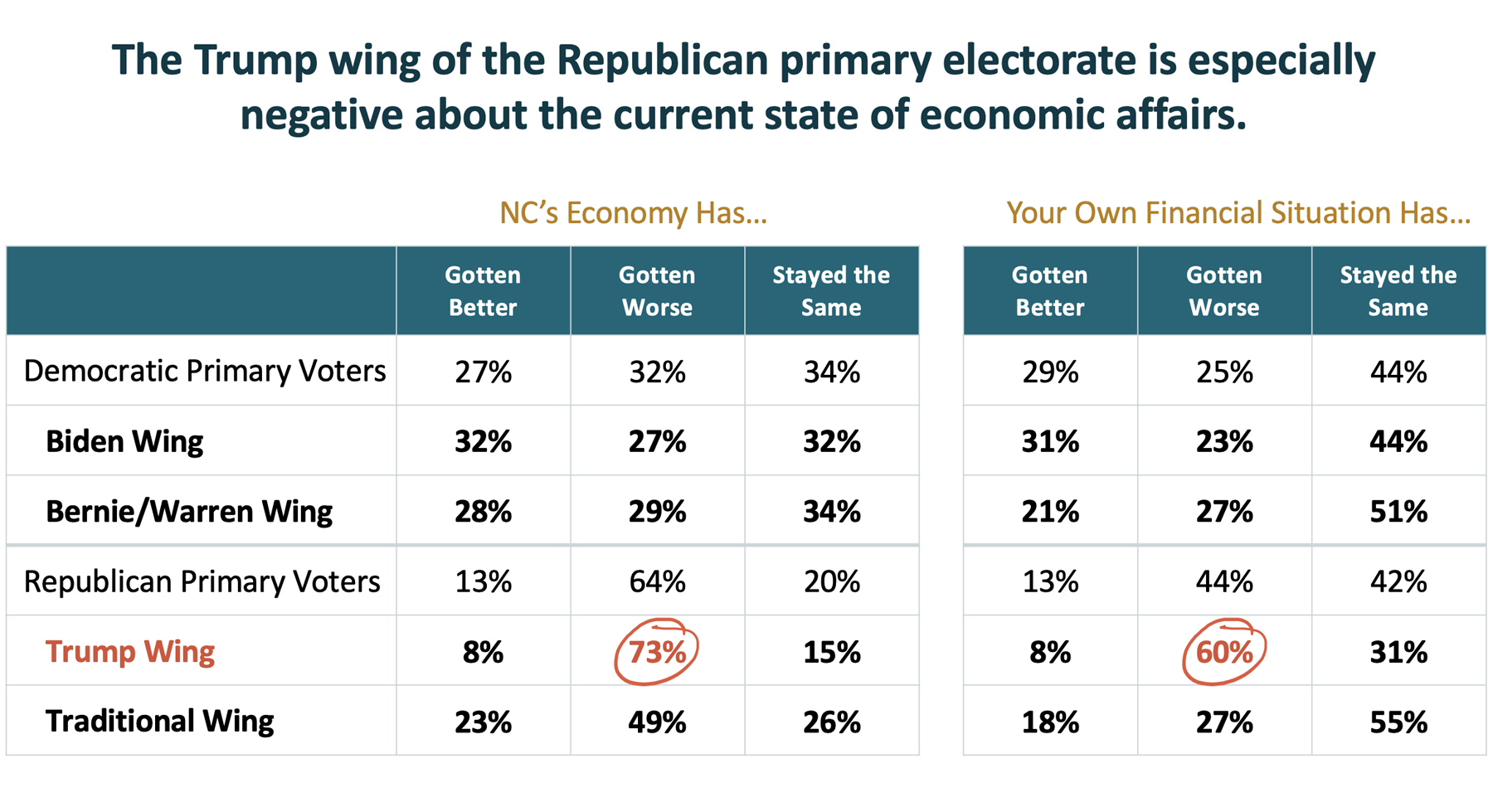
Next, respondents were asked: “Looking ahead one year, do you expect North Carolina’s economy to get betters, get worse, or stay the same?” While the general electorate is fairly evenly split on the question (32% said that it would get better, 32% said that it would get worse, and 24% said that it would stay the same), Democratic primary voters felt strongly that it would get better (49%) and Republican primary voters felt strongly that it would get worse (47%).
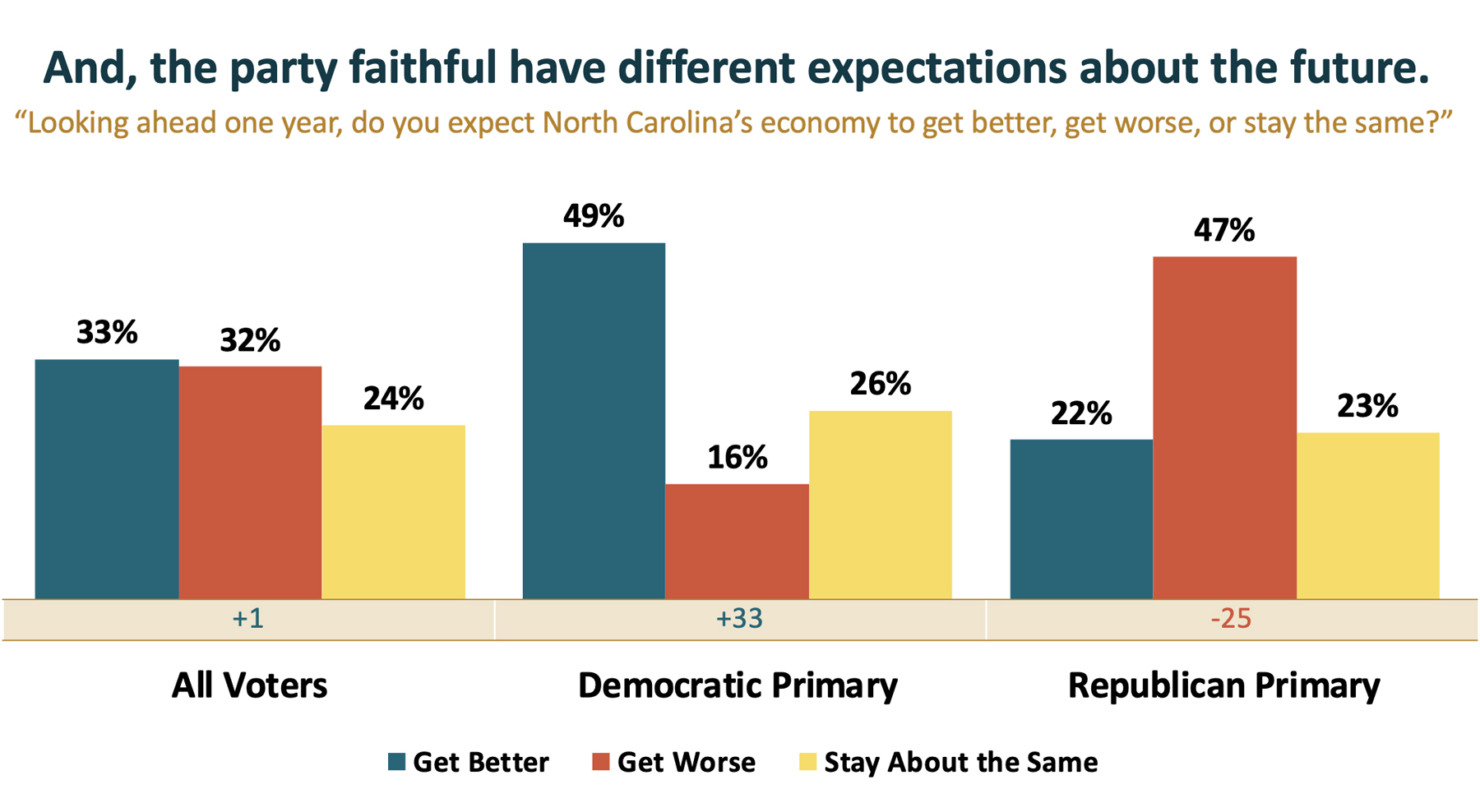
State Taxes
Two thirds of all voters agree that lowering income taxes on families and businesses help create jobs and grow the economy (with Republican primary voters feeling more strongly (at 75%) and Democrat primary voters feeling less strongly (at 58%).

And a striking majority of those polled (74%) said that they support the tax cuts included in North Carolina’s most recent budget (with both Democratic and Republican primary voters more strongly supporting them at 78% and 76% respectively).

While respondents overwhelmingly support the lowering of state income taxes, 53% of North Carolina’s voters continue to believe that their state taxes have gone up over the last five years. In fact, since the conservative majority in the state legislature first enacted comprehensive tax reform in 2013, rates have been lowered incrementally from a high of 7.75% in 2010 to 5.25% this year. (Editor’s note: this year’s bipartisan budget lowers the personal income tax rate to 3.99% starting in 2026 and completely phases out the corporate tax rate by 2029.)
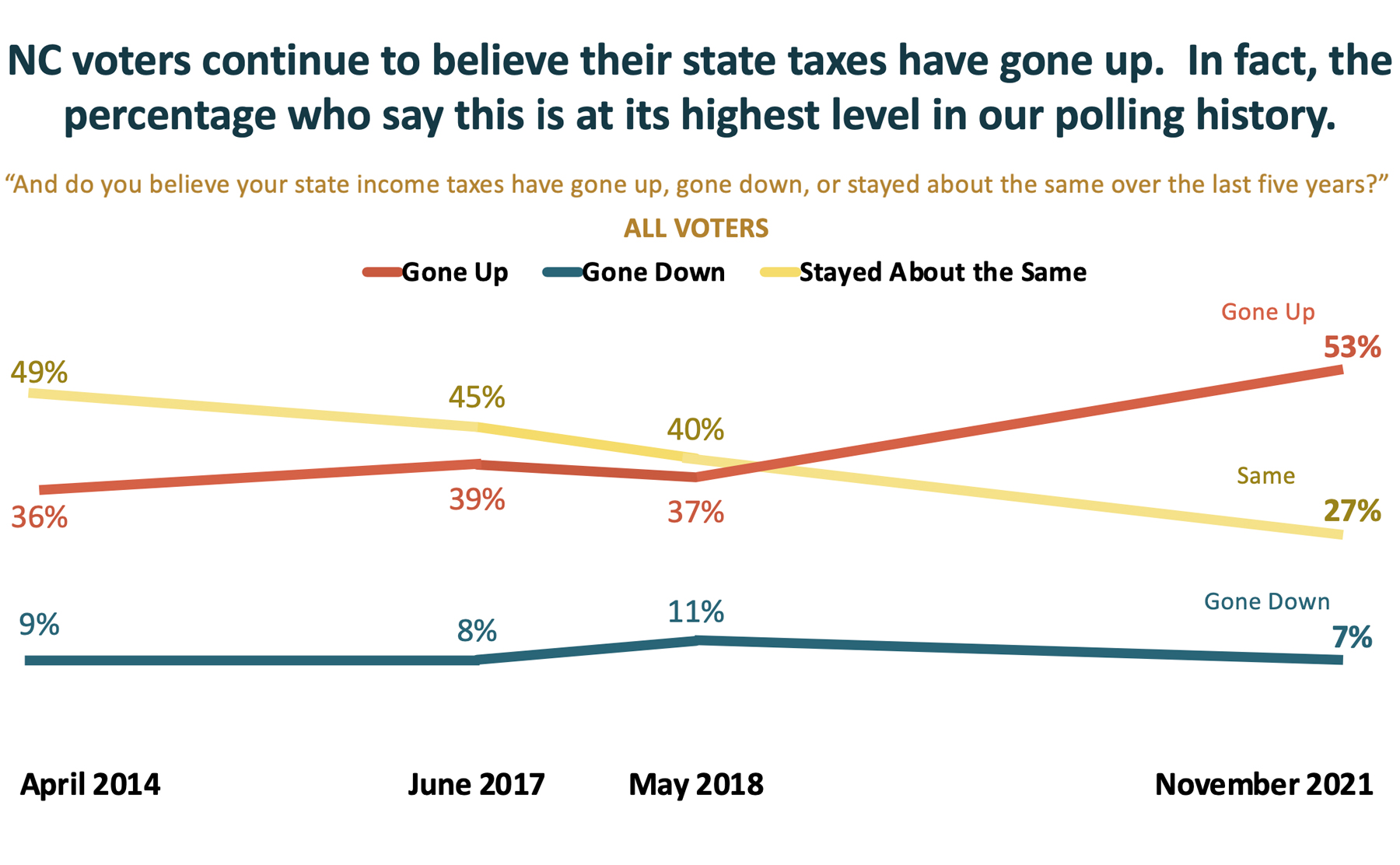
Republican primary voters — who most strongly support lower taxes — are more inclined to believe that state income taxes have gone up over the last five years: 54% of Republicans believe that their state income taxes have gone up, whereas 42% of Democratic primary voters believed so. And looked at another way, just five percent of Republicans believe that their state income taxes have gone down over the last five years, nine percent of Democratic primary voters, and seven percent of all voters believe that their state income taxes have gone down.
